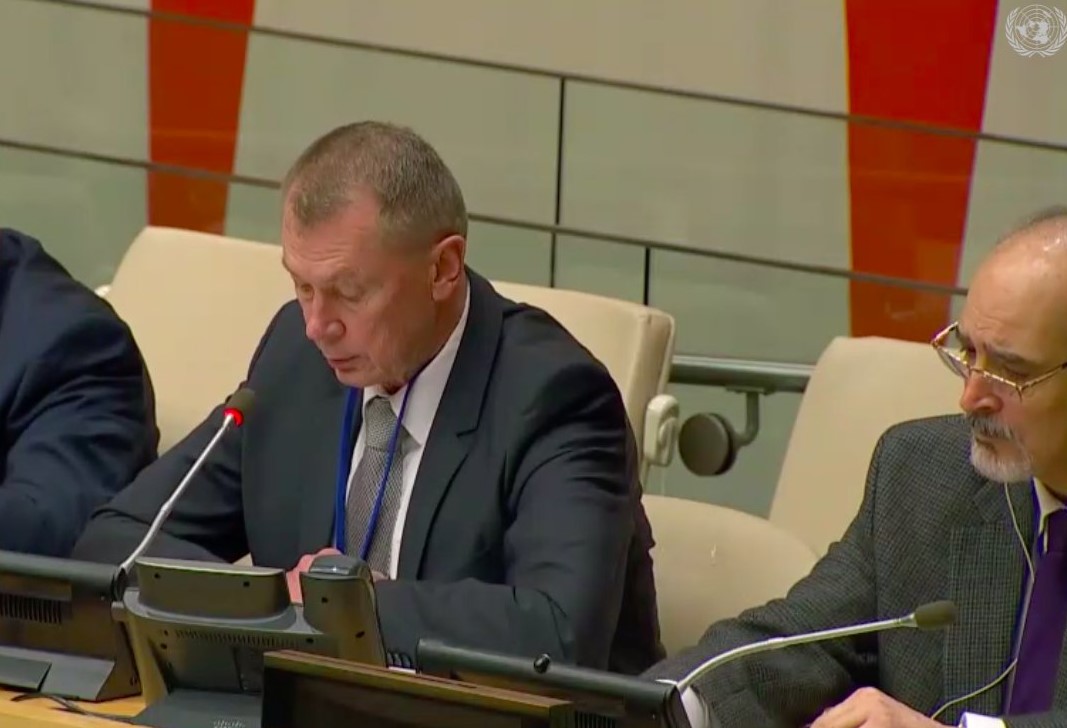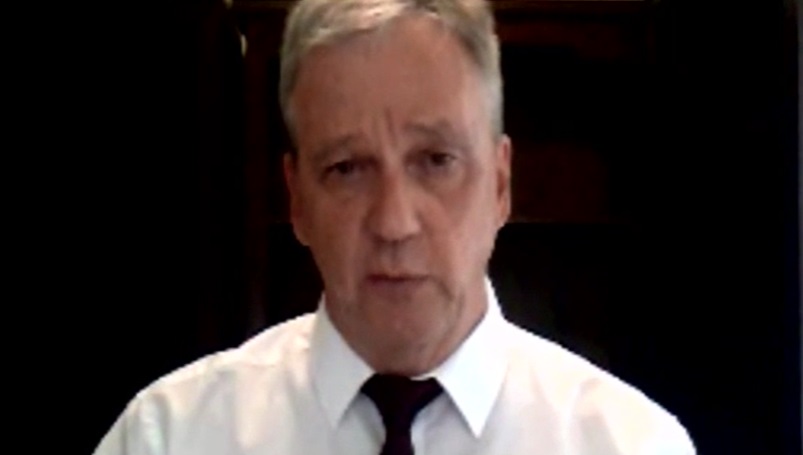
On Monday, Russia stepped up its campaign against identifying the perpetrators of chemical attacks in Syria with a specially-convened meeting at the UN. Though held under the auspices of the Security Council, it was what is known as an "Arria" meeting – a discussion that's not treated as formal Council business.
With presentations by Russian ambassador Alexander Shulgin, Syrian ambassador Bashar Jaafari, Maxim Grigoriev of Russia's Foundation for the Study of Democracy and a guest appearance by former OPCW inspector Ian Henderson speaking by video from an unknown location, it amounted to a box-set compilation of various leaks and allegations that have been swirling around on the internet over the last few months.
The result was a rather odd spectacle where Russia found itself uncritically citing claims promoted by conspiracy theorists in order to accuse the OPCW of unprofessionalism in the conduct of its Douma investigation.
In a report last March, the OPCW's Fact-Finding Mission (FFM) found "reasonable grounds" for believing a chemical attack took place in Douma in April 2018. Critics – including Russia – say the incident was "staged" by rebels in order to falsely incriminate the Assad regime.
| ADVERTISEMENT |
The Fact-Finding Mission's mandate prevented it from attributing blame and the attacks on its report can be seen, at least in part, as a pre-emptive strike against another OPCW body – the Investigation and Identification Team (IIT).
Unlike the Fact-Finding Mission, the IIT does have the power to attribute blame. It is looking into a number of cases in Syria – including Douma – with the aim of identifying the perpetrators of chemical attacks and is now "in the process of concluding its work on the first incidents under investigation", according to a OPCW report issued last month.
Critics say the OPCW is not fit to be entrusted with this task and cite alleged "irregularities" in the Douma investigation as evidence of that.
In 2017, Russia used its Security Council veto to shut down another body with the power to attribute blame – the Joint Investigative Mechanism (JIM) that had been established in 2015 . During its first year the JIM attributed three chemical attacks to Syrian government forces and a fourth one – involving sulfur mustard – to ISIS/Daesh fighters. It was unable to reach a conclusion regarding five other cases.
Operating under the joint auspices of the UN and the OPCW, the JIM had initially been given a one-year mandate. As its first year came to an end there was work still to be done and wrangling broke out over an extension. Russia was reluctant but on that occasion did not oppose an extension. However, its UN representative at the time, Vitaly Churkin, demanded that the JIM should not be used as a tool to criticise the Syrian government.
With its mandate extended for a further twelve months, the JIM took up two new cases identified by the FFM. One was the sarin attack in Khan Sheikoun which, according to reports at the time, killed at least 74 people and injured hundreds more. The other was a mustard gas attack in Um Housh, in Idlib province, the previous September which injured two women.

In what turned out to be its final report, the JIM blamed ISIS/Daesh for the Um Housh attack and the Syrian government for Khan Sheikhoun. Reviewing the two cases in tandem helped to give an appearance of even-handedness but Russia had already rejected the FFM's version of events in Khan Sheikhoun on which the JIM based its findings.
The Russian veto did not mark the end of attempts to identify chemical weapon users and in June 2018 a special session of the OPCW's governing body, the Conference of the States Parties, voted to establish a new attribution mechanism under the auspices of the OPCW rather than the Security Council – which meant Russia would not be able to veto it. Russia and its allies did oppose the move but were unable to muster enough votes to block it.
Since then, Russia has made two attempts to sabotage the IIT – first by trying to delay the start of its activities and then, last November, by opposing the OPCW's 2020 budget in what was seen as ploy to starve the IIT of funds.
Syria and chemical weapons
A compilation of blog posts and documents looking at the arguments and the evidence
As for what should happen regarding Douma, at Monday's meeting ambassador Shulgin called for "holding a briefing with the involvement of all the FFM experts that worked on the incident in Douma in order to at last find a consensus conclusion of what happened". He also said this should take place "under the OPCW" and "possibly with the support of all states that are not indifferent to this state of affairs".
His proposal might not seem unreasonable at first sight, but there are problems with it. For a start, there's no reason to think it would result in consensus, because the OPCW's governing body, the Conference of the States Parties, is already divided over Syria, with entrenched positions on both sides. The likely effect would be to make the situation even more politicised rather than less.
The OPCW was originally conceived as a technical body, outside politics. Its experts were supposed to be trusted to do their job properly, without fear or favour, and there were safeguards to protect them from outside influences. Most of the time the OPCW's work was uncontroversial and, before the Syrian conflict broke out, decisions on matters of substance were almost always agreed by consensus without the need for a vote. The chemical issue in Syria, though, has broken the consensus.
There's general recognition that for organisations like the OPCW consensus is desirable, but the question is at what price. In practice, restoring consensus would mean limiting OPCW activities to whatever steps can be unanimously agreed upon – and there is still plenty of uncontentious work to be done in the fields of verification, monitoring and non-proliferation (especially among non-state actors). But insisting on consensus would also mean giving up on attempts to identify the perpetrators of chemical attacks in Syria – which probably explains why Russia thinks consensus is such a good idea.
The counter-argument is that non-compliance with the Chemical Weapons Convention is far too serious to be brushed aside – that the OPCW exists to uphold the Convention and if there was ever a time to take a strong stand, this is it. According to that view, the issue is not just about Syria but about the signal the OPCW sends to other potential users of chemical weapons.

 RSS Feed
RSS Feed
